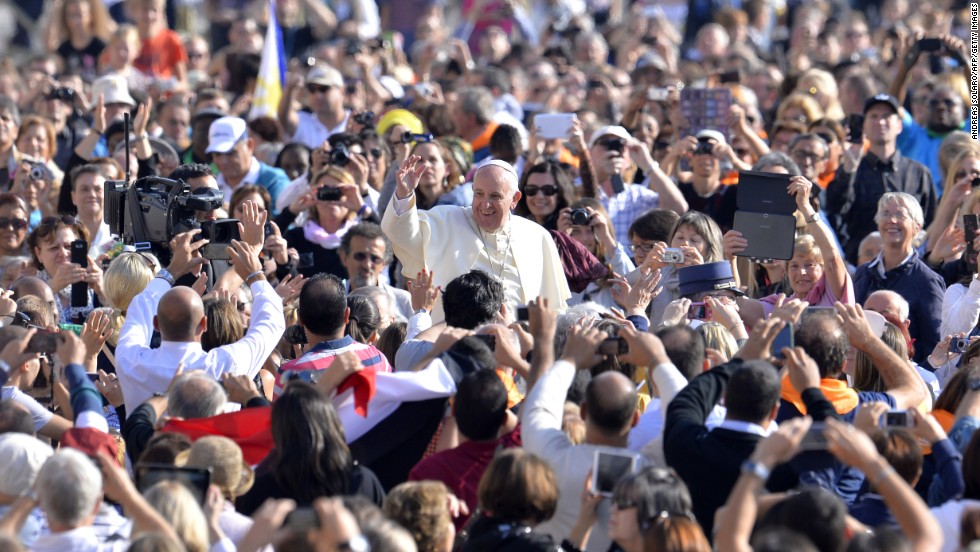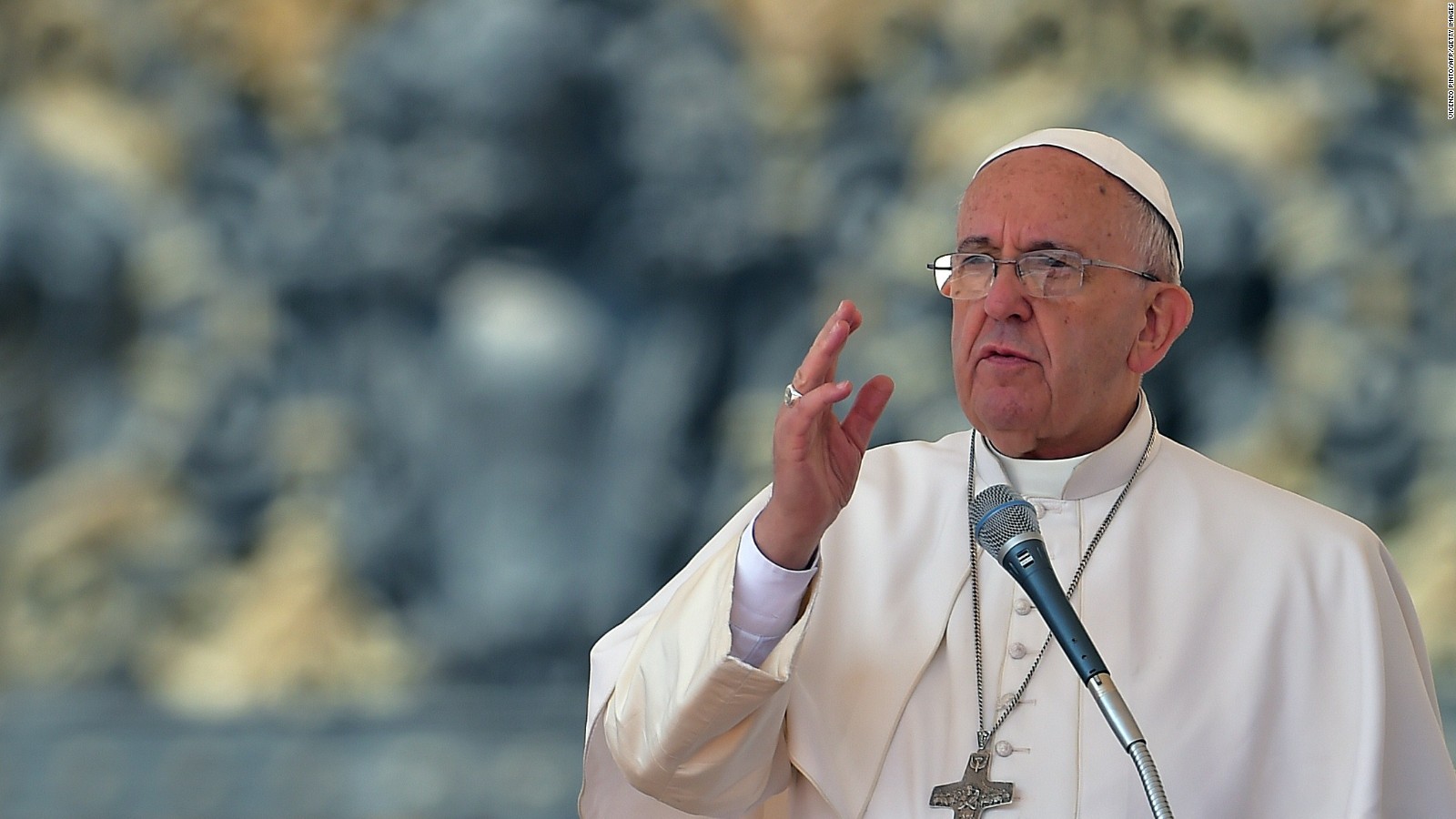(CNN)Pope
Francis warned Thursday that a broad sweep of human activities -- from a
blind worship of technology to an addiction to fossil fuels and
mindless consumerism -- has brought the planet to the "breaking point."
"Doomsday predictions," the Pope said in a sharply worded manifesto, "can no longer be met with irony or disdain."
Citing
scientific consensus that we are witnessing a "disturbing warming" of
the Earth, Francis embraced the view that humans are largely to blame
for a dramatic change in the climate.
Nothing short of a "bold cultural revolution" can halt humanity's spiral into self-destruction, the Pope warned.
"The
earth, our home, is beginning to look more and more like an immense
pile of filth," Francis said. "In many parts of the planet, the elderly
lament that once beautiful landscapes are now covered with rubbish."
The
popular pontiff castigated big businesses, energy companies,
short-sighted politicians, scurrilous scientists, laissez faire
economists, callous Christians and myopic media professionals. Scarcely
any area of society escapes his probing pen.
Though
it ends with a prayer, it is a deeply pessimistic statement, at least
in parts, particularly from a spiritual leader known for his hopeful
messages of mercy and openness. People no longer seem to believe in a
happy future, the Pope lamented.
Francis'
challenging manifesto came Thursday in the form of an encyclical, a
letter traditionally addressed from St. Peter's Square to the more than 1
billion Catholics across the globe. Derived from the Greek word for
"circle," an encyclical is among the church's most authoritative
teaching documents.
But
Francis has set his sights far beyond the circle of his church. With an
eye toward several key climate change summits scheduled for later this
year, the Pope said his letter is addressed to "every person living on
this planet."
"I would like to enter a dialogue with all people about our common home," Francis said.
Critique of modern life
The humble invitation belies the damning analysis of modern life contained in the 184-page encyclical, entitled "Laudato Si."
The archaic Italian phrase, which means "Praised Be To You," appears in
the "Canticle of the Sun," a song penned by St. Francis, the patron
saint of ecology.
Subtitled,
"On Care for Our Common Home," the encyclical was published Thursday in
at least five languages during a news conference at the Vatican. The
document was more than a year in the making, church officials say, and
draws on the work of dozens of scientists, theologians, scholars from
various fields and previous popes.
"We
have a situation here," said Janos Pasztor, the U.N.'s assistant
secretary-general for climate change, "in which science and religion are
totally aligned." Pasztor was part of a team that convened with church
officials at the Vatican this April.

Pope Francis
The
Pope's eagerly awaited encyclical recycles some of the now-familiar
themes of Francis' papacy: an abiding concern for the poor, a scorching
critique of the idolatry of money and a facility for using evocative and
earthy language to describe complex conundrums.
As
the first Pope from the developing world, Francis brings a moral vision
shaped not in the seminaries of Europe but the slums of Buenos Aires,
Argentina.
With language ranging from
the majestic (lyrical poetry in praise of nature) to the mundane (take
the bus!), the Pope put his signature stamp on a controversial topic and
moral clout on the line.
"Laudato si"
is long on laments and short on specific solutions, though the Pope
repeatedly urges deep thinking and dialogue to address the complex
symptoms now plaguing the earth. In broad strokes, Francis calls for a
drastic change in "lifestyle, production and consumption" from
superficial and unsustainable habits to more mature means of caring for
"our common home."
"What kind of world
do we want to leave to those who come after us, to children who are now
growing up?" Francis asks. "The question not only concerns the
environment in isolation; the issue cannot be approached piecemeal."
And
while the Pope calls for practical steps like recycling and improving
public transportation, he said structural injustices require more
political will and sacrifices than most societies seem willing to bear.
In short, our care for the
environment is intimately connected to our care for each other, he
argues, and we are failing miserably at both.
"We
are not faced with two separate crises, one environmental and the other
social," Francis writes, "but rather one complex crisis which is both
social and environmental."
The rich and
powerful shut themselves up within self-enclosed enclaves, Francis
argues, compulsively consuming the latest goods to feed the emptiness
within their hearts, while ignoring the plight of the poor.
The
poor, meanwhile, find themselves on the run from natural disasters and
degraded habitats, shunted to the bottom of the world's pile of problems
with decreasing access to its natural resources.
Francis
saves his most challenging questions for modern consumers, arguing that
humanity has become enamored of another apple -- and this time no Eve
or serpent are around to take the fall. The temptation may have shifted
from a forbidden fruit to cutting edge technology, but the sin remains
the same: hubris.
"We are not God," the Pope warns, "The Earth was here before us and has been given to us."
'Bottom of the pile'
Though
Popes since Paul VI in 1971 have addressed environmental degradation,
"Laudato Si" is the first encyclical to focus primarily on creation
care, the Christian idea that God gave humans the earth to cultivate,
not conquer.
Even months before its
publication, the encyclical drew criticism from conservatives and
climate change skeptics, who urged the Pope not to put his moral weight
behind the controversial issue of global warming.
Many
Catholics and environmentalists, meanwhile, eagerly awaited the
encyclical. The Washington-based Catholic Climate Covenant, for example,
plans to send homily hints to the 17,000 Catholic parishes in the
United States for priests to use during sermons this summer. The group
is also planning media events with bishops in Iowa, California, New
Mexico and elsewhere.
In the weeks
before the encyclical's release, Protestant pastors and at least 300
rabbis in the United States also said they were willing and eager to
embrace Pope's call for environmental justice.
A Brazilian group made even made a tongue-in-cheek trailer
ahead of Francis' encyclical, portraying the pontiff of a spiritual
superhero gearing for battle against the forces of evil -- energy
executives.
In another sign of the anticipation awaiting the encyclical, the news that an Italian magazine had published a leaked draft of the document online on Monday made the front pages of several American newspapers.
From
the first days of his papacy, Francis has preached about the importance
of the environment, not only as a scientific concern but also a moral
one. In his first homily as pontiff, Francis called six times during the
short sermon for humans to protect creation.
The
encyclical published on Thursday goes well beyond any sermons, delving
into fields familiar to any Catholic, such as Scripture and theology,
but also wandering into sociology, politics, urban planning, economics,
globalization, biology and other areas of scientific research.

The pope has said he hopes his encyclical on the environment will reach a wide audience.
Broken
into six chapters, "Laudato Si" begins by cataloguing a host of ills
wracking the planet: dirty air, polluted water, industrial fumes, toxic
waste, rising sea levels and extreme weather.
The problem is "aggravated," the Pope said, "by a model of development based on the intensive use of fossil fuels."
If
present trends continue, Francis argued, the changing climate will have
grave implications for poor communities who lack the resources to adapt
or protect themselves from natural disasters.
Many
will be forced to leave their homes, while the economically and
politically powerful "mask" the problems or respond with indifference,
the Pope said.
The poor may get a
passing mention at global economic conferences, Francis says, but their
problems seem to be merely added to agendas as an afterthought.
"Indeed, when all is said and done," the Pope said of the poor, "they frequently remain on the bottom of the pile."




No comments:
Post a Comment